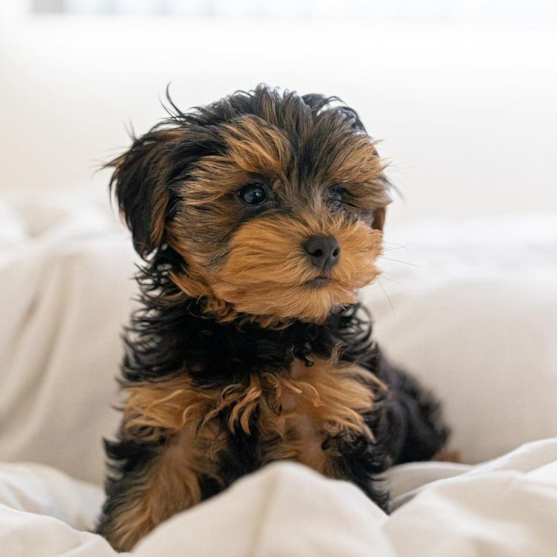Yorkie Poodle

The Yorkie Poodle or Yorkipoo is a beautiful mix of two popular breeds – the Yorkshire Terrier and the miniature or toy Poodle. As is the case with many Poodle hybrids, this breed was originally bred to be a hypoallergenic companion to those who suffer from dog allergies.
The qualities of the Yorkie and Poodle blend well, with the sweet and gentle Poodle side mellowing out the playful and brave Yorkie temperament. The Yorkipoo also has a razor-sharp intellect, and they tend to excel at dog sports such as agility and obedience. All these qualities combined make for a wonderful family pet and companion.
Temperament
The Yorkie Poodle is an outgoing and active dog who enjoys being around people. While there is a wide range of personalities with a hybrid breed, a well-socialized and well-bred Yorkiepoo will generally be a feisty and fun-loving companion for their owner. Most Yorkie Poodles will be adventurous and charismatic little dogs who overflow with personality. Like many other intelligent small breed dogs, they may not realize just how small they actually are, and can tend to think that they’re the boss of the household. Because both of the parent breeds thrive on human interaction, Yorkie Poodles will typically be the same way. They’ll bond extremely well with their owners and family members, and will tend not to want to be left alone for long periods of time. Because both the Yorkie and the Poodle can be wary of strangers, it takes them a little while to warm up to new friends. Well-trained Yorkie Poodles can get along with other dogs, but if given the choice, they’ll spend more time with their owners and family.The Ultimate Guide to Yorkie Poodle
Origins
Like many other Poodle hybrids, the Yorkie Poodle is a fairly young breed. Intentional breeding of the Yorkie Poodle only became popular in the last decade or so. The goal behind the creation of this breed was a hypoallergenic dog with improved health compared to either parent breed. Most Yorkiepoos these days are still the result of first-generation breeding. There have also been efforts to create more multigenerational lines of Yorkie Poodles, but these are the exception rather than the rule.
Key Characteristics of Yorkie Poodle
| Yorkie Poodle | The Yorkie Poodle is an outgoing and active dog who enjoys being around people. While there is a wide range of personalities with a hybrid breed, a well-socialized and well-bred Yorkiepoo will generally be a feisty and fun-loving companion for their owner.
Most Yorkie Poodles will be adventurous and charismatic little dogs who overflow with personality. Like many other intelligent small breed dogs, they may not realize just how small they actually are, and can tend to think that they’re the boss of the household.
Because both of the parent breeds thrive on human interaction, Yorkie Poodles will typically be the same way. They’ll bond extremely well with their owners and family members, and will tend not to want to be left alone for long periods of time. Because both the Yorkie and the Poodle can be wary of strangers, it takes them a little while to warm up to new friends.
Well-trained Yorkie Poodles can get along with other dogs, but if given the choice, they’ll spend more time with their owners and family. |
| Exercise Needs | Both the Yorkshire Terrier and the Poodle are high-energy breeds, so the Yorkiepoo tends to be the same. However, they don’t need too much exercise, as their small size means that they’ll get a fairly good workout just walking throughout the house.
Like the Yorkie and the toy or miniature Poodle, the Yorkiepoo will be satisfied with around half an hour of exercise throughout the course of a day. It’s a good idea to split this time into a couple of shorter sessions, as the Yorkiepoo tends to not have a great deal of stamina. Equally important is the Yorkie Poodle’s mental stimulation, which can be fulfilled with dog puzzles and toys.
Yorkie Poodles are also athletic enough to engage in dog sports such as agility and obedience. While they may not excel the same way that bigger, stronger, and faster dogs can, doing some backyard training is good for their physical and mental health. |
| Yorkie Poodle Grooming | The Yorkie Poodle was bred for a hypoallergenic coat, though there can be some variation in the coat types that Yorkie Poodles develop. They may take after the Yorkie side or the Poodle side, but one thing that should be consistent is the silken, soft hair that they have. The coat itself may be straight like a Yorkie’s, or curly like the Poodle.
Yorkie Poodles are considered a low or non-shedding breed, though they still require regular brushing to maintain the health of their coat. The Yorkiepoo needs daily brushing to prevent tangles from forming into painful mats. Baths can be done when the Yorkie Poodle gets particularly dirty from outdoor activities, but most owners settle on a schedule of once every two to four weeks.
Like most other small breeds, Yorkie Poodles are prone to dental problems, so regular tooth brushing is necessary. Daily brushing is recommended. Nail trimming can be done every two weeks or every month, depending on how quickly the dog wears down their nails. This may be a challenge to do at home due to the size of the Yorkiepoo’s nails – getting it done by a professional may be necessary. |
| Yorkie Poodle Training | Yorkie Poodles are very trainable dogs, and learn quickly due to their high intelligence. It’s not uncommon for the Yorkiepoo to pick up commands within a couple of tries. However, some Yorkie Poodles may be stubborn or independent-minded, though usually this is due to training being too repetitive for them.
The Yorkie Poodle is smart, and because of this they may get bored easily. It’s good to have variety in their training sessions to keep them engaged. Short, focused, and fun sessions will yield better results than marathon training sessions.
In addition to variety, positive reinforcement is the best way to get a Yorkiepoo excited for training. Negative reinforcement tends not to work well with this breed, as they may simply refuse to listen after punishment. It’s much more productive to offer praise, play, or treats when the dog displays proper behaviors. |
| Yorkie Poodle Lifespan And Health Issues | Yorkie Poodles are generally healthy dogs and can have a life expectancy of up to 10 to 15 years. Yorkie Poodles may be prone to:
|
| Yorkie Poodle Size and Space Requirements | The Yorkie Poodle is a diminutive breed and can easily fit into any size home. They stand between 7 to 15 inches at the shoulder, and can weigh between 3 to 15 pounds when fully grown. Because the Poodle parent may be bigger than the Yorkie parent, the size of the Poodle parent will generally dictate how big the Yorkiepoo grows.
Most Yorkie Poodles will be adaptable dogs who will do well in almost any household, whether in the city or in more rural areas. Apartment living is a fine idea for a Yorkiepoo, as they don’t need too much space. However, Yorkie Poodles can be very vocal, and early training is required so that they don’t bark too much and annoy the neighbors.
The Yorkie Poodle, like other companion dogs, is an indoor dog through and through. They’re too small to be safely left outside, as other animals may view them as prey. They also get bored and lonely easily, so they need a great deal of attention from their owners and family members. |
Other considerations:
- Yorkie Poodles are generally considered to be hypoallergenic, though some people may still have an allergic reaction to them.
- The Yorkie Poodle is a barker, and even well-trained Yorkie Poodles who can mostly control their barking impulse may still be too noisy for some people.
- Like many other small breed dogs, Yorkie Poodles can be difficult to house train due to the size of their bladders.
How can I take good care of my Yorkie Poodle or Puppy?
Proper socialization
A Yorkie Poodle puppy needs early socialization to learn good habits and behaviors. Like many other small breeds, they may develop bad behaviors because they never learned good manners as puppies. Early socialization work can be done as soon as you bring home your Yorkie Poodle puppy.
Proper nutrition
Yorkie Poodle puppies should get high-quality, premium dog food so that they develop properly. There are small-breed specific dog foods that will have the correct nutrient balance for a Yorkie Poodle puppy. If you have any concerns about your Yorkie Poodle puppy’s weight, diet, or appetite, your veterinarian may have more specific dietary recommendations.
Up-to-date vaccinations
Upon bringing home your Yorkie Poodle puppy, it’s a good idea to contact your veterinarian. They will be able to give you more specific advice regarding the puppy’s vaccination schedule. Follow the schedule your veterinarian gives you to ensure that your Yorkie Poodle is adequately protected from common transmissible diseases and bacteria.
Most Asked Yorkie Poodle Questions
-
+How Much do Yorkie Poodle Puppies Cost
